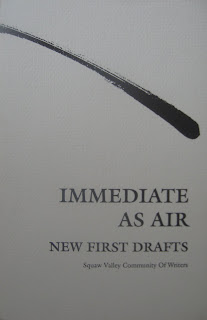In July 1989 I attended the Squaw Valley Poetry Writing Workshop, held high in the Sierra Nevadas, with an all-star cast of working poets as instructors: Galway Kinnell, Sharon Olds, Robert Hass, and fourth and least-known the sweet and lovely Brenda… well, leave her at that. The others were brilliant but slightly too aware of it; Brenda was friendly, kind in her criticism, gentle when pointing out the obvious flaws in the demi-poems we amateurs abandoned sleep to sweat over and submit.
But that’s really peripheral to the story I want to tell. The instructors themselves sometimes wrote new poems according to the requirements they gave us each day—whether for a particular subject, specific form, so-called free verse, or even per the welcome “Just write something!” (I remember that Kinnell one evening offered up a multi-page blockbuster, one of his best poems ever, I think, titled “When One Has Lived a LongTime Alone.”)
Some years earlier I had started a lengthy, multi-part poem about my maternal grandparents and their farm in rural Georgia. (The village of 300 lent its name: “Mystic.”) Told through the eyes of a Northern visitor, a young boy slowly growing older and more aware, it was heavy on local color and Deep South details, not flinching from any half-perceived racism, but presenting the Spiveys’ many kindnesses too. I’d never managed to finish it—still haven’t, all these years later, even though some passages in it are as good as I can write.
One night at the workshop, I got the idea to write a set of Blues lyrics—that is, the words to a non-existent tune I’d just include as one section in the long poem. I went right to work and in a couple of hours (yeah, sometimes the magic works) had a decent set of verses. When I showed and read them aloud the next day, I got lots of puzzled looks along with some decent praise. So I polished those Blues lines some and added themto “Mystic.”
The last piece I posted (see it just below this one) concerned Martin Luther King, Jr. and Blues pianist Otis Spann; and writing it brought back my brief attempt to compose a creditable set of lyrics. Not that I’d intended to pass them off as some rare discovery I’d made, but… well… at one point I did. I’d been reading the series of books by Dutch scholar Guido van Rijn in which he quotes the words to scores of politically conscious Blues numbers (see below), and I decided to send my lyrics to him for a reaction—preferably arousing his academic curiosity, maybe even having earned his admiration.
Here are the lyrics I wrote:
Tobacco grow low an’ green, sweet corn yella an’ tall
Tobacco done growed so green, corn stand yella an’ tall
Blackstrap molasses, that’s the sweetes’ sugar of all
See brown bug in the cotton, there’s trouble in the fields
Boll weevil in the cotton mean trouble in the fields
Folks cain’t chop no squares when they force’ to kneel
Work song for daytime, people, blues come on at night
Work song ‘fore sundown, the blues on til' late at night
I jes’ cain’t figure out why you never treat me right
All you be doin’ wrong bound to come back on you
Say all you be doin’ wrong bound to come back on you
You find out further on what it mean to be black an’ blue
You scorn me an’ mistreat me, but I am with you still
Scorn me an’ mistreat me, know I be with you still
Ain’t but the one road goin’ on up this hill…
Van Rijn emailed me back, confident in his opinion, that all this was obviously a put-up job, modern lyrics probably written by some white liberal. Man, I was mortified. But I owned up to him, explained why I’d had a go at a politicized Blues; and that was that.
Except... I've got this fractured poem... Georgia heat, a dark smokehouse, black folks and white suspicious as ever, and some damn liberal's Blues clutterin' up the place. “Mystic” may never be finished.





particularly enjoyed this one, my friend.
ReplyDeleteit remains a MrE who this particular MrA may B... still, 1 does appreciate prAAAse, even when anonymous('s).
ReplyDelete